#any time a woman does something even passingly annoying we treat it like a fucking crime
Text
what is with men being mad any time a woman raises her voice where did that even come from. someone posted a video of a small electrical explosion, and the top comment was of course the woman screams. the second comment is women try not to scream challenge, level impossible. i had to go back and watch the video again. there is, somewhat fainty, a little gasp emitted off-camera, more of a yelp than a scream. it is mostly lost in the crack of the explosion. afterwards, you hear her voice, shaken, say, are you okay?
i am helping one of my friends train her voice pitch lower, because she wants to be taken seriously at work. she and i do each other's nails and talk about gender roles; and how - due to our appearance - neither of us have ever been able to be "hysterical" in public. we both appear young and sweet and feminine. she is cisgender, and cannot use her natural voice in her profession because people keep saying she appears to be "vapid". we both try to figure out if our purposeful voice lowering is technically sexist. is it promoting something when you are a victim to it?
a storm almost sends a pole through a car window. in the dashcam, you can hear the woman passenger say her partner's name twice, crying out in alarm. she sounds terrified. in the comments, she is lambasted for her lack of calm. how is that even fucking helping?
in high school, i taught myself to have a lower voice. i had been recorded when i was genuinely (and righteously) upset; and i hated how my voice sounded on the phone speakers when it was played back. i was defending my mom, and my voice cracked with emotion. it meant i was no longer winning the argument: i was just shrieking about it.
girls meet each other after a long summer and let out a little joyful scream. this usually stops around 12-14, because people will not tolerate this display of affection (as it has the effect of being passingly annoying). something about the fact that little girls can't ever even be annoying. we are trained to examine each part of our lives (even joy) for anything that could make us upsetting and disgusting. they act like teenage girls are breaking into houses and shrieking you awake at 3 in the morning. speaking as a public school educator: trust me, it's not that bad, you can just roll your eyes and move on. it does not compare to the ways boys end up being annoying: slurs in graffiti, purposefully mocking your body, following you after you said no. you know, just boy things.
there's another video of a man who is not allowed to yell in the house, so he snaps his fingers when he's excited about soccer. the comments are full of angry men, talking about how their brother is unfairly caged. let him express himself and this is terrible to do to someone. eventually the couple has to address it in a second video: they are married with a newborn baby. he was trying not to wake the infant up. there is no comment on the fact women are not allowed to yell indoors. or the fact that it could have been really alarming or triggering for his wife. sometimes i wonder if straight men even like women, if they even enjoy being in relationships with them.
for the longest time, i hated roller coasters because it always felt inappropriate and uncomfortable for me to scream. one of my friends called me on it, said it was unusual i'm so unwilling. i had to go to my therapist about it. i don't like to scream because i was not raised in a safe situation, and raising my voice would have brought unsafe attention towards me. even when i am supposed to scream, it feels shameful, guilty. i was not treated kindly, so i lack a basic form of self-protection. this is not a natural response. it is not good that in a situation of high adrenaline - i shut up about it.
something very bad is happening, i think. in between all the beauty standards and the stuff i've already discussed - this one feels new and cruel in a way i can't quite express. yes, it's scary and silencing. but there's something about how direct it is - that so many men agree with the sentiment that women should never yell, even in an emergency - it feels different.
is the word shriek gendered automatically? how about shrill or screech? in self defense class, one of the first things they tell you is to yell, as loud and as shrilly as you can. they say it will feel rude. most women will not do this. you need to practice overcoming the social pressure and just scream.
most women do not cry out, even when it's bad. we do not report it. we walk faster. we do not make a scene. what would be the point of doing anything else? no matter what we do, we don't get taken seriously. it is a joke to them. an instagram caption punchline. we have to present ourselves as silent, beautiful, captivating - "valuable."
a woman is outside watching her kids when someone throws a firecracker at them. she screams and runs towards her children. in the comments, grown men flock together in the thousands: god. women are so annoying.
#warm up#writeblr#this one has bothered me for a bit#any time a woman does something even passingly annoying we treat it like a fucking crime#hey man. women are allowed to be annoying. everyone forever is allowed to be passingly annoying#as long as they aren't hurting anyone/thing#like u wanna know something? i find it super annoying that men don't wear seatbelts#why arent there thousands of comments on driving videos thats just like : men try not to die in a car crash challenge#''this briefly annoyed me''. okay??????? AND????????????????? go get ur self a cookie and calm down about it#ur not entitled to control other ppl's experiences and emotions just so u can maintain ur own peace#if being briefly annoyed ruins ur whole day! you! need! therapy!!!!#men try not to become immediately angry about nothing challenge: level impossible#ps author is nonbinary. we didn't even get into the gender presentation thing#the fact men think it's SEXY that my voice is on the lower end....
20K notes
·
View notes
Note
What does the manga add to Roy and Riza's relationship that the anime doesn't have? Asking out of curiosity since I'm an anime only and they're still one of my favourite pairs of all time!
Oh, ha, I didn’t specifically point to the manga because I have anything in particular against Brotherhood (…or 2003 for that matter) it’s just not my canon, and I’m used to specifying which version of FMA I mean when I talk about the series. I do have a list of petty grievances against Brotherhood, but there is nothing fundamentally altered between Roy and Riza.
..
I mean. Yes. A number of my petty grievances are related to them. And feel slightly less petty as thought is spent on them.
But I would need to go back and watch the anime scenes again to point out the specifics of why.
[many hours later]
(As a note about this post, since I guess I did make the choice of tagging it, this is heavily critical about some specific moments in the Brotherhood anime, but before I get started I want to emphasize that my problems, with the exception of an example that spans a volume, don’t cover even two minutes of video. These things exist, and they bug me, and I clearly have things to say about them, but Brotherhood is 64 episodes long. My impassioned hatred of a few choice features isn’t indicative of my overall feelings on the anime.
Essentially, this is me having fun whining. Not trying to set off landmines. I hope it proves enjoyable.)
So there is this scene change in the first five minutes of episode 19 that has my eternal hatred and I have no plans to ever forgive. That has been true since it aired, and it is still true here today, because I am insufferably stubborn.
(I actually did a session about it before. I’m probably going to repeat most of it, but have a link if it interests you.)
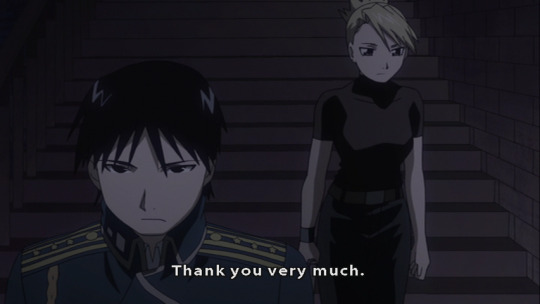
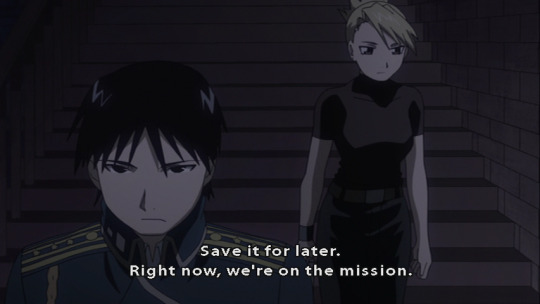
That is not the dialogue the manga goes with.
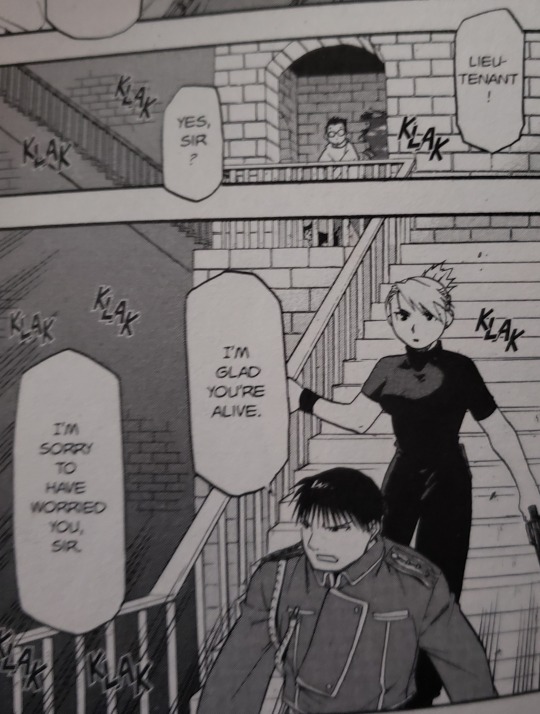
In the manga, Riza’s interaction with Roy is focused on “what the fuck were you thinking why are you here.” Both versions have the scene with her berating Mustang for endangering the mission to save her.
In the anime, the above screencaps are what follow. After giving him a hard time for showing up at all, she thanks him for saving her life. Sweet, I guess, except Roy fires back with a mission-focused response.
If I were doing an anime-only meta thing, something could be said about the hypocrisy of Roy playing hero only to lecture other people about concentrating on the mission, and it would just be another cute thing. I guess. If I were in a charitable mood maybe.
But this is the first anime adaptation I sat through properly, angsting about every twist and turn and change.
My grudges. They last.
In the manga, Mustang brings up the slightly more personal aspects of what has happened. The reason he runs after Hawkeye is that he just lost Hughes, he won’t lose her, and he loses his head entirely. They have the yelling session over it, and he basically yells back the equivalent of, “yeah yeah fine -sulk sulk sulk-”
They leave Fuery and Hayate behind, and we have the presented moment.
Going to assist Riza is not the Proper choice for the military operation they’re running. It was a dangerous thing for Roy to have done, and she rightfully calls him on it. But he does it because he cares, and the fact that he cares is why all these people follow him. He’s a hopeless, idealistic dreamer at heart. His squad is loyal to him because he’s loyal to them.
Roy Mustang is a damn softy.
In the anime, Riza’s the one to call attention back to the whole life-saving motive. In the manga, it’s Roy.
In the anime, when it comes up, Roy dismisses it.
In the manga, when it comes up, Riza apologizes for worrying him.
It’s a small moment, but small moments are allowed to matter, and when small moments are changed, it leaves a bigger impact than if they were just left alone.
In the anime, this exchange, plus Hawkeye’s smile after, suggests that the sentimentality of the relationship comes primarily from her. Riza’s the one having her heart warmed when they have a job to do.
…That’s a slightly meaner way to put it than the scene perhaps deserves, but there is no unfair bitterness like unfair bitterness towards Brotherhood for me. Whining about this adaptation is a thing I do, despite honestly loving the majority.
Anyway, in the manga, the scene is both of them putting legwork into their dynamic. Hawkeye yells at Mustang for showing up out of sentiment, but when he expresses that sentiment in the aftermath, she expresses understanding of his perspective. He did a stupid thing, but they’re a team, and both at ease with their interplay.
In the anime, stop talking Hawkeye, don’t you know we have a job.
The manga is a conversation, the anime is putting a wall up to prevent that conversation. Especially annoying is that the character putting the wall up is the one who initiates the conversation in the manga. The anime drags Mustang back from his emotional openness and pushes Hawkeye to be more so, then provides a dismissal of her acting that way.
Besides being an inverse plus a step back for their relationship, it. also just feels kind of sexist. Instead of the man talking about feelings, the woman is. When the man talks about his feelings, it’s greeted with understanding and respect, when the woman talks about her feelings, it’s greeted with the instruction to put it somewhere else.
The fact that they changed it bothers me, because the way it is in the manga is great. It’s one of many small moments Roy and Riza have where they are shown to respect and care for each other.
The anime version doesn’t add anything, and lessens the mutuality of that bond.
I snarl in its general direction.
The other change that springs to mind is of a similar cloth.
Mustang and Hawkeye encounter the Elrics before they’re aware of Hughes’ death, and Mustang makes up a story about Hughes retiring in the country with his family so that they won’t go looking for him.
Hawkeye greets this with the face of judgment. “Why are you treating him like a child all of a sudden?” He’s never shied from giving Ed adult responsibilities before. This is a blatant lie. Roy says they don’t need any further obstacles to their journey.
A few moments pass. In silence, in the manga. In the anime, Riza points out that they’re going to find out someday. Then…
“…Who am I trying to kid?”

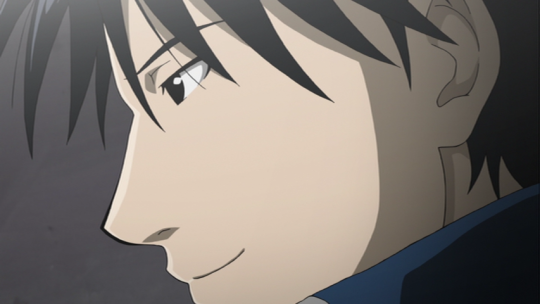

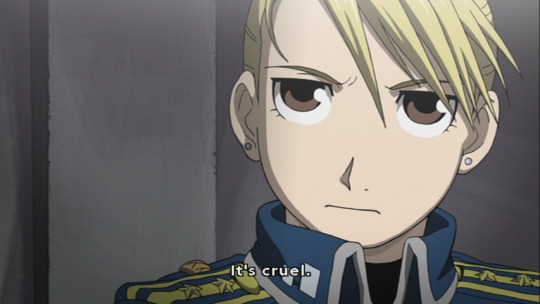
(Funimation, the heck is with some of your translation choices. Did you just keep the simulcast version for the official DVD subs?)

So there are a few things. The most obvious difference is the dialogue changes. Hawkeye is more insistent about how the Elrics will find out at some point, then after Mustang makes his character commentary, she calls it cruel instead of sighing and moving on to the next topic.
The other most obvious change is that Mustang smiles after calling himself soft in the anime.
These all sort of play together.
In the manga, Hawkeye is just as judgmental as she is in the anime, but she allows Mustang the space to dwell on his choices for himself. She asks him one question about how he’s treating Edward, then they walk in silence, her disapproval creating a tangible aura.
It isn’t simply Hawkeye judging him. He’s judging himself. In the anime it comes off as a, “tee-hee, what a silly softhearted boi I am.” So in the anime, she vocally objects to what he’s doing.
In the manga, Mustang takes in his inability to break the news to the Elrics as the emotional flaw that it is, and Hawkeye lets him off the hook. He doesn’t need a lecture; he knows his shortcomings. It’s not great, but he’s the kind of person who doesn’t want to tell Ed and Al that Hughes is dead because Hughes tried to help them.
Again, Mustang’s softness is part of what endears him to his crew. It is not always a good trait. Sometimes, as in this case, it’s actively causing problems. But it is who he is.
Riza knows this, and she can let this failure pass with a sigh because Roy knows it too. The anime version has a smile when it’s nothing to smile over. The manga version is more, “hahaha… fuck.”
Roy and Riza know each other and themselves extraordinarily well. They might have the boundaries of superior and subordinate, but they are comfortable enough in their understanding of each other that they are allowed to be themselves. It’s the conversation thing. There is an undercurrent of figurative dialogue to their relationship that never stops.
When they do call each other out in the manga, it does not keep the conversation from flowing. It continues it. Both of the above changes take it to a stuttering halt in their scenes.
Then we have episode 30.
After which, I do not have memories specific enough to shout about things or know if there are things to shout about, but episode 30.
-screams forever and ever and ever-
-intersperses screams with tears of anguish-
From what I know of being an FMA fan, it is difficult to be an FMA fan without being passingly familiar with the debates of which version is better. Usually it’s Brotherhood vs. 2003. My personal, obviously right opinion, is that this is the wrong way to do it, and it should be manga vs. 2003, because really it’s an argument over which plot is better, and Brotherhood’s plot is the property of the manga.
I also think it’s impossible to really debate. The two series have different feels and themes. They are both extremely well done, meaning that which one you prefer comes down to personal preference.
I’m pretty sure people who bother to have those discussions could say a lot more on the topic, but that’s my general, broad stroke, very glossed-over perspective on it all.
I mention this because I think anyone who loves FMA should read volume fifteen of the manga. If you’re not a manga person, you don’t want to read 27 volumes of manga, yeah, understandable. You have your version of the story, enjoy it, you shouldn’t feel the need to read the original if you don’t want to. The idea that you have to pour every bit of content into your brain to be a good fan is pretty unhealthy.
But I recommend volume 15 regardless, because the anime does not come close to presenting its content. It is four chapters devoted to the Ishvalan War. Outside the framing device (Ed going to return Hawkeye’s gun and asking about what went down), the entire volume basically stands on its own.
It is a harrowing, intimate depiction of the genocide campaign. That is the focus of the entire volume.
Scar’s backstory is moved to an earlier section in the anime, and Mustang burning Hawkeye’s back is moved to the Envy fight, so this might be an unfair barb to throw, but I still want to say it. The anime covers this volume in one episode.
-goes back to screaming-
(Honestly though, some of the best fun I ever had in fandom came from being on a forum full of manga fans and all of us yelling our despair over Brotherhood’s choices. You would never believe that this anime was considered the gold standard of anything.)
But we’re here for Roy and Riza!
There’s only one thing that sincerely bothers me to pain of the irritation of the above. Most of my sulking is just why did they do this to my favorite volume. Mustang and Hawkeye’s stuff is mostly intact. Except when it isn’t.
Chronologically, the first complaint is that when Riza’s father collapses (dies), Mustang is alone with him. In the manga, the scene ends with a shot of Riza, watching, terrified, from the doorway.
Also known as the scene where Roy calls Riza by her first name.
-still screaming-
The cemetery scene is truncated. The anime jumps right into Roy and Riza discussing Roy becoming a soldier. The manga starts the scene out with the focus on funeral things. Roy asks if Riza has other family, and what she plans to do now.
After that, he offers her his number, and they get to talking about the military and Roy’s dream.
They also cut this.

In the anime, Roy discusses his military life through the lens of Master Hawkeye’s opinion on it, asking if Riza is going to disapprove as well. Roy starts talking because he assumes that’s how she feels about it, and preemptively defends his perspective.
In the original, when Roy hands Riza his information, she asks, “For the rest of your life…?” It’s followed by the above panel.
Roy’s monologue about his aspirations and his dream for what he can do as a member of the military happens because Riza asks. Not directly, but her addition to the conversation prompts him to talk about his views, and he mentions that those views are why he studied alchemy. In other words, why he’s standing in front of a grave, awkwardly trying to talk to his dead master’s daughter.
Following that, the original pays more attention to the lead-up of Riza entrusting Roy with her father’s research. In the anime, she jumps straight from the ideals topic to asking if she can trust him with it.
In the manga, there’s that beat of contemplation after Roy brings up alchemy, and how his master didn’t teach him everything.
Riza tells him that his dream sounds wonderful.
Another beat.
That’s when she tells him that her father did leave his alchemical secrets behind. Words about this are exchanged for a small number of panels.
In the anime, she asks Roy if she can entrust her father’s work (dream, values) to him. Directly after the dream dialogue.
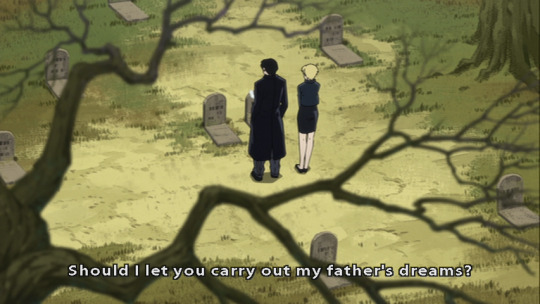
In the manga, when Roy tries to bring their discussion back to Riza’s father, and what he did with his research, Riza redirects him. It isn’t about her father. It’s about her, and by consequence, Roy, and how Roy’s dream inspires her.
“That dream… Can I entrust you with my back so that I can help make it come true?”
The anime severely underplays the significance of Riza offering her father’s research to Roy. They address it a little once Envy is being dealt with, but in the manga, all of the discussion of Riza watching Roy’s back is drawn from how Riza’s back is what’s given Roy the power to rise as far as he has.
It goes from maintextual subtext to subtextual subtext.
Also, the cuts to their conversation just plain means that there’s less of Roy and Riza interacting. The two of them are very, very young, standing in front of a grave and talking about ideals. The longer manga version allows the quality of their youthful awkwardness to truly shine.
The scene is dropped in the middle of the volume, whereas in the anime, it opens the Ishvalan flashback. There’s much to be examined about how that affects the emotional impact, but… geez that gets to be a lot of threads. Trying to go through all of the ways they crammed a whole volume into one episode is just going to make me dizzy.
Even if the theoretical focus of this post weren’t shipping, I’m not sure my brain would be up for that. There’s just so much going on, and the time allotted means it’s a Frankenstein job.
The one major difference for Roy and Riza, which I can’t believe they went with, and can’t believe my sad feelings every time I watch the episode and confirm yeah, they really went that way with it.
Why why why why why why why why must you hurt me this way.
SO!
THE ANIME VERSION!
OF ROY AND RIZA MEETING IN ISHVAL!
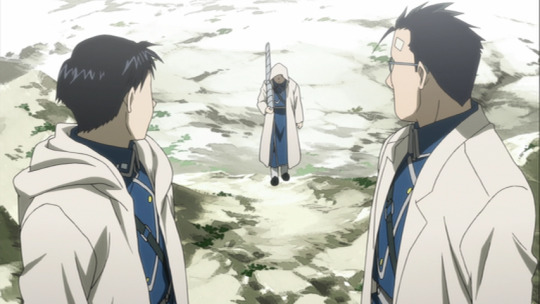
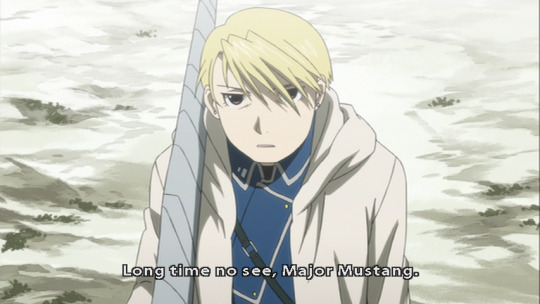
Riza walks up and says hi after noticing them because Hughes is babbling about his future wife.
Yay.
The manga version does not. does not do that.
It.
That’s not how it goes.
At all.
In the manga, Roy and Hughes run into each other on their break and start chilling together. Hughes gets a letter, does his excited babbling, Roy tells him to stop being a stereotypical red shirt, when suddenly

Oh noes.
Roy and Hughes react as fast as they can, which might or might not end up fast enough, when a bullet goes through the Ishvalan’s brain.
There’s quiet for a moment, then Roy gets behind cover because oh no gunshot, and Hughes tells him to chill, it’s all good.
“We have the ‘hawk’s eye’ on our side. […] A real ace sharpshooter… who’s causing quite a stir in my circle of friends. She’s still in the academy but because she’s so skilled… they brought her to the front.”
Guess who.
Hughes and Roy, being the good people they are, go back to camp to thank the sniper for saving them. Hughes is his cheery self. Roy is not noticeably perturbed.
Then the sniper drops her hood and stands up.

You could say I prefer the manga version. It has Riza being a badass, and adds to the shock they both have of seeing each other here.
Riza gets her own little horrified section of panels all about it.
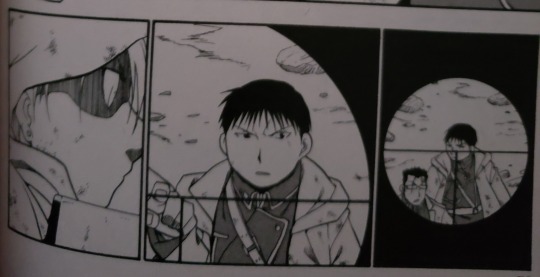
She was just helping out two soldiers. She didn’t realize until after she fired that one of them was Roy, and that he’s in this hell too.
The other thing that I enjoy about this particular sequence of panels is that in the manga, they come up a bit earlier. Throughout the manga, Ishval flashback panels are everywhere. As this scene is initially presented (Hawkeye looking at Mustang through her scope), many chapters earlier, it looks like maybe they’re on opposite sides.
Or maybe it’s just me who thinks that’s a thing.
In any case, it adds some serious drama to their reunion. In the anime, the drama is entirely that they are both here in this awful war. In the manga, a Mysterious Sniper saves Roy’s life and turns out to be his master’s daughter.
It’s just cooler, okay?
Their conversation when Riza becomes Roy’s aide is also truncated. Riza says her specialty is guns, because death doesn’t linger when you use them. Roy tells her, with what I feel is sympathy, that’s just a deception to make the work easier. She agrees, but because she’s decided that work is necessary, there we go.
…
I thought that would be my last thing, but now that I have volume fifteen open, I can’t help but go to the scene during the Envy stuff. I won’t touch the main scenes of that, though I’m sure there are changes, because this is already too long and I’ve officially gone through the things that personally affect my view of the anime, which… was, at some point, maybe, the point of the ask. ^^;
Basically, I will never stop if I go through everything, but in case it isn’t obvious, I really love the fifteenth volume, so to Envy we go.
Huh. They really didn’t alter much. The core’s all there. Because of the placement, Mustang gets docked a few lines, and he is rewarded one of Riza’s (about making the tattoo as illegible as possible) in return, but it’s basically the same, with the addition of Riza thanking him.
I have no particular feelings on that. The ending of the scene is different because it’s not intended to go with the rest of the Ishvalan War, and… I guess I could manufacture some dislike over Riza expressing gratitude instead of the pure stubbornness the manga has. It distracts a little from why she’s asking those secrets to be burned off. They’re in a hell of their own creation. The soft thanks blurs the cutting edge.
Which isn’t to say I can’t have other problems with it.
As a manga reader who enjoyed Brotherhood as it was coming out, as well as someone who is writing this mostly from memory and going over only specific scenes, I have no way to ascertain how clear it is to anime fans what happens with Riza’s back and when. In the manga, it is excruciatingly clear that her father puts his research on her back, that is how Roy comes to have Flame Alchemy, and that is what Riza asks him to burn off.
Since that’s all in volume fifteen, the next twelve volumes are read with the understanding that before Riza is instructed to watch Roy’s back in case he falls, she offers him her back, and brings the ruin of Flame Alchemy to Ishval.
That history defines them. Their own choices plant them in that war, but Roy uses the alchemy she gives him out of hope for a better world to commit genocide. It’s a horrific weight on both of them, and his decision to have Riza, of all people, watch his back after the war?
Dude, it is such an amazing ship detail. Riza entrusts her back to Roy. He, in turn, entrusts his to her.
I get why it’s moved. Sort of. Given that volume fifteen is given one episode, I get why it’s moved. It’s most heavily relevant to Roy’s rampage against Envy.
However, I don’t think the power of knowing the depths of their connection earlier on can be understated. Roy and Riza’s devotion and synergy comes from watching their shared idealism burn the people they wanted to protect to a crisp, and their commitment to never letting that happen again. They create a hell through their good intentions. Having done that, they do not abandon their good intentions. They refine them and continue forward.
That is what binds them together. They rise from the ashes of their flames.
I do not, for the most part, think Brotherhood does them a major disservice. My gripes are pretty much all listed above, and my praises are endless.
But if you really love Roy and Riza, I’d seriously recommend reading the manga at some point, because there’s stuff the anime doesn’t bother with. AKA, yes, there is even more royai to be uncovered, don’t you want to seeeeee? :D :D
This kind of obviously grew past what you were initially asking, but I hope it serves a satisfactory answer regardless! Thanks for the opportunity to spam my love for these two!
…Through spamming my hate of stuff, but we’re ignoring that.
157 notes
·
View notes